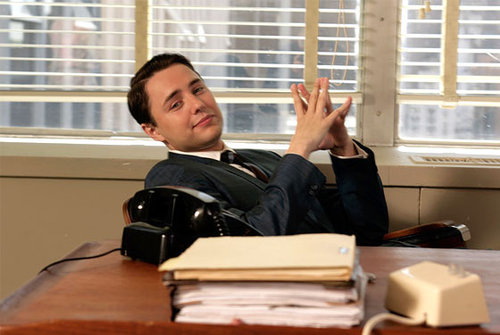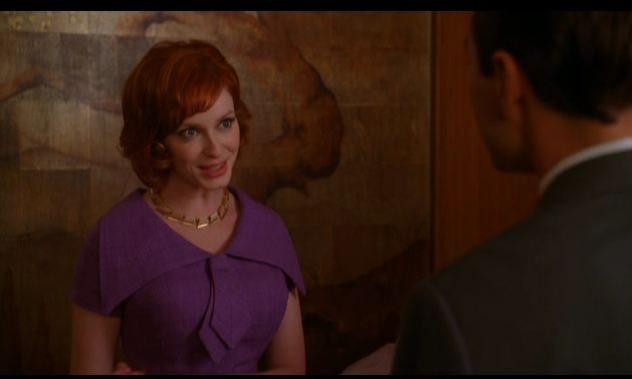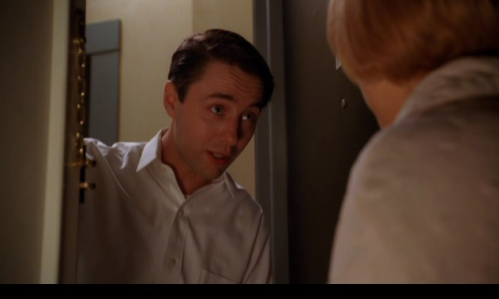 TV
TV In Which I Don't Think You've Done It Before This Way
 Monday, October 12, 2009 at 3:44PM
Monday, October 12, 2009 at 3:44PM 
Doesn't That Mean Anything To A Person Like You?
by ELEANOR MORROW
I do believe in a fate that will fall on us if we do nothing.
— Ronald Reagan
Never trust anyone who takes politics seriously. An old friend and I had a falling out recently. She's the sort who takes every happening as an omen or some call to greater purpose. Now she reminds me of Don Draper, for whom a vibrant women sweating in the wee hours in the morning is a signal from the Gods.

Coincidences are everywhere. A world without them would be stranger than a world in which our perceptions, shaped by our innate desires, seem an oracle for our own behavior, and the future of a nation.

The irony of "I have a dream" is that he had no such dream. He had a wish, a desire, and helped turn it into fate. Don Draper is the same man, his wife isn't so different. She writes in the same flowing lefty script as our president - like him and Conrad Hilton, the plan is to bring America to the world whether they like it or not. Under their purview, the wants and desires of others mean nothing.

Our own will becomes immaterial in such matters. A greater concern takes over: the repressed or overt desire of how one wishing to dominate another. It's fun to see Don so oppressed by another, so subject to the wishes of a man exactly like himself.
 the actual conrad hilton This is the Mad Men obsession, titling the show Various Rapes of the 1960s Period would be more honest. Matthew Weiner is consumed with lording his superiority over others (even his own writers), and yet he wants to show dominance in a light beyond the mere threat of violence, the subject of The Sopranos. This is men and women as lords, more royalty than any English court, summoning and unsummoning themselves until everything is in the exact right position from its opposite.
the actual conrad hilton This is the Mad Men obsession, titling the show Various Rapes of the 1960s Period would be more honest. Matthew Weiner is consumed with lording his superiority over others (even his own writers), and yet he wants to show dominance in a light beyond the mere threat of violence, the subject of The Sopranos. This is men and women as lords, more royalty than any English court, summoning and unsummoning themselves until everything is in the exact right position from its opposite.

This is politics, not life. Politics is gross opposition and summary, not substance. Real life, on the other hand, consists of men who believe they're ordained pronouncing their own personal moralities on others. They achieve nothing in particular except to scare the most decent among us into submission.

But these are minor foibles of lesser men. You're only really taking fate into your own hands for sure if you sex Don Draper's wife. You have to be one fucked up little bursar to attempt that trick. And if you can't close off that, you deserve the blue-balled result. When you concoct a plan whereby Don Draper's wife comes to bang you at your office, you don't have to be Tucker Max to seal the deal.

"You had to come to me," says Betty's graying little fuck puppet. Adulterers have such entertaining moralities. Many of them still lecture us on what we should be. To watch the honest, decent people crushed under this morass is difficult business, and this might be why Mad Men isn't wildly popular among the regular people like The Sopranos was. They see enough injustice on the news.

Now we are simply waiting for these indiscretions to come to light. Betty dances at the periphery of our visions - the most likely way for the subplot of her affair to be resolved is by her on the floor of City Hall, realizing she's not exactly sure what impulse she has surrended to. Destroyed by a fleeting vision of his own personal God, Sal tries to surrender to as many impulses as he can in the Central Park gay scene.

As Sal weeps in his office among his art, he blames himself and his own churlish nature for the unlucky result. Perhaps he curses the fates, nevermind that. Power is transient, fleeting - as a smarter one than Don once said, "you can't take it with you."
The obsession with smoking permeates the milieu. It is Mad Men's recurring cameo, the cigarette, always a joke to represent both the innocence and the impurity of the age. Don marvels at how naive (or stupid) his schoolteacher crush is for making her students read the words of Martin Luther King Jr. We recognize it is he who is either innocent or stupid. He believes that the way he acts is other than the mere caprice. He believes his life is art. He is wrong.
Eleanor Morrow is the senior contributor to This Recording. She is a writer living in Manhattan. She tumbls here.

"First Chance" - David Gray (mp3)
"Breathe" - David Gray (mp3)
"Nemesis" - David Gray (mp3)















































